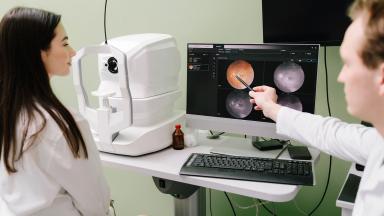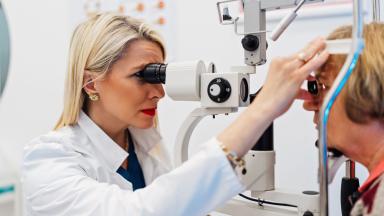Delivering hospital eye care closer to home
The NHS Confederation is an improvement-focused organisation and we are committed to supporting members to implement and identify solutions to known national challenges.
A key challenge for health services is how to practically provide care closer to home rather than in an acute hospital, to help reduce waiting lists and improve access and experience for patients.
Ophthalmology, or hospital eye services, are a key area in which patient experience can readily be improved by making use of and building upon existing resources outside of hospitals such as community and primary care services including high-street opticians.
Our programme is supporting multidisciplinary teams across a neighbourhood, acute and ICS footprint to understand, plan and create the infrastructure and processes to move ophthalmology care closer to a home via optometry practices in local neighbourhoods.
The approach to the programme
The programme will run for 8-months from November 2025 to July 2026. There will be a total of six virtual learning sessions, with up to six teams selected across England.
Through the programme, teams will receive extensive support to design and create solutions to move services for their chosen sub-discipline of ophthalmology from a hospital setting into the wider community.
Participating teams
Organisations | Area of focus |
|---|---|
| Team Hertfordshire and West Essex | Urgent eye care - reducing attendances at A&E for minor conditions. |
| Team North East and North Cumbria | Glaucoma - standardising pathways for patients with ocular hypertension (HT) and chronic open angle glaucoma (COAG). |
| Team Humber and North Yorkshire | Glaucoma - improving processes for monitoring, managing and following up with patients with glaucoma or suspected glaucoma. |
| Team North West London | Medical retina conditions - improving processes for monitoring and managing lower risk conditions including ocular naevus, age-related macular degeneration (AMD), vein occlusion, and hydroxychloroquine (HCQ). |
| Team North West London | Children and young people's services - integrating pathways. |
| Team Surrey Heartlands | Glaucoma - improving processes for monitoring, managing and following up with patients in community settings. |
| Team Leicestershire & Northamptonshire | Glaucoma - improving processes for monitoring, managing and following up with patients in community settings. |
| Birmingham and Solihull | Children and young people's services - improving screening. |
The objectives are to support teams to:
- Identify, plan and agree the scale of transition
- Work together with peers and experts to create a robust implementation plan
- Create a final blueprint for service transition
Having launched in November 2025, we will be sharing outcomes from the programme as it progresses.
Expert Partner

Primary Eyecare Services is a not-for-profit primary eye care provider at scale. They operate in 800 neighbourhoods working with multiple Integrated Care Boards across England, delivering high quality eye care services. They collaborate with Local Optical Committees, NHS commissioners and NHS trusts to provide locally accessible eye care to patients at scale. Their services are provided in neighbourhoods via local opticians, from the smallest independent practices to the largest chains.
This programme is also being supported by the Q community, which is hosted by the NHS Confederation. Q is diverse membership community collaboratively accelerating the improvement of care in the UK and Ireland. The community learns together, supports each other and shares insights and approaches to address health system challenges. By leveraging the knowledge and experience of the community and partners, Q has a ‘whole world’ view of health and care in the UK and Ireland.













